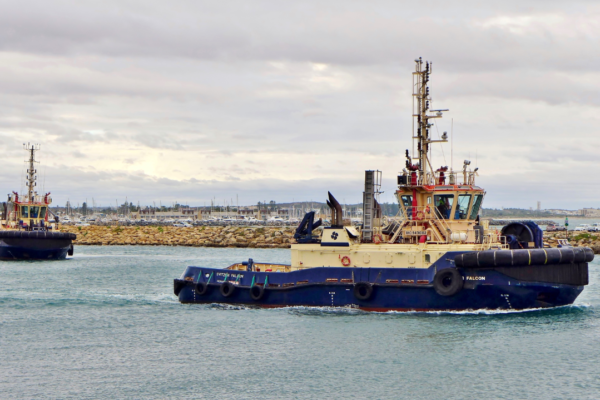In February we were reporting that tugboat operator Svitzer had called on the FWC to intervene and prevent unions from calling strikes at major ports around the country. Then last week we wrote about the reverse situation where the unions appealed to the FWC to stop Svitzer from locking them out. The result was that Commission ordered a six-month suspension on any industrial action by Svitzer or the three unions involved.
Image above: Tugboats Svitzer Eagle (left) and Svitzer Falcon (right) near the entrance to the inner harbour of Fremantle Harbour, WA.
Those unions are: the Construction, Forestry, Maritime, Mining and Energy Union (CFMMEU), the Australian Maritime Officers Union (AMOU), and the Australian Institute of Marine and Power Engineers (AIMPE). The FWC (Fair Work Commission) on this occasion used its powers to stop industrial action that threatens to cause significant damage to the economy or part of it.
Why is all this important to our clients? Svitzer, a subsidiary of Danish shipping giant Maersk, employs 582 staff at 17 major Australian ports. Its services are critical to hauling containerships into and out of ports and it completes 40,000 harbor tow jobs annually. Its tugboats guide the arrival and departure of vessels carrying about 75% of Australia’s trade. In other words, if it stops, all your cargo stops too.
It should be noted that this is a longstanding dispute that has been going on for three years. Svitzer and the unions began negotiating a new enterprise agreement in late 2019. The company wanted changes to the agreement that had been made back in 2016 to give it greater flexibility in hiring staff, which was opposed by the unions.
The concept of an employer locking out staff – as opposed to the employees going on strike – is not unprecedented. In 2011 Qantas used the strategy when it shut down its fleet to push the commission to arbitrate its dispute with unions over a new enterprise agreement (EA). Qantas was widely considered the winner in the subsequent arbitration.
Another unusual side to this issue is that, according to the websites Salary Expert and PayScale, the salary in Australia for a senior level (8+ years of experience) tug boat captain is upwards of A$144,828.00. The average tug boat captain gross salary is A$117,306 or an equivalent hourly rate of A$56.00, plus they earn an average bonus of A$4,094. An entry level tug boat captain (1-3 years of experience) earns an average salary of $83,194.
So why are they complaining? It didn’t help when their employer’s massive profits were declared earlier this year. Svitzer is owned by Danish shipping giant Maersk who, in 2021, recorded a net profit of $US18.7 billion – the largest figure ever recorded by any shipping company. Svitzer’s cost-cutting operations have also come under attack in the UK and the Netherlands.
They offered their Australian workers a 1.5% increase this year, far below the official CPI increase of 6.1% over the past 12 months. Moreover, as the current EA expired in 2019, workers did not receive a pay rise in 2020 or 2021. They have been told that annual pay rises will be tied to the CPI in 2023–2025.
So, industrial action that would have crippled Australia’s ports in the lead-up to Christmas has been delayed for now, but the dispute that has now been dragging on for years has shown up the flaws in the country’s industrial relations system and the need for reform of the collective bargaining mechanism. For now, the issue has just been kicked down the track.
As a licensed Customs Broker and International Freight Forwarder, Colless Young offers you professional advice on all your international trade and shipping activities. We provide a complete range of logistics services, both air and sea cargo, for your imports and exports at all Australian ports and airports. We handle trucking, warehousing and fumigation treatment. We’ll give you correct advice on current shipping schedules, freight rates and terminal fees.

